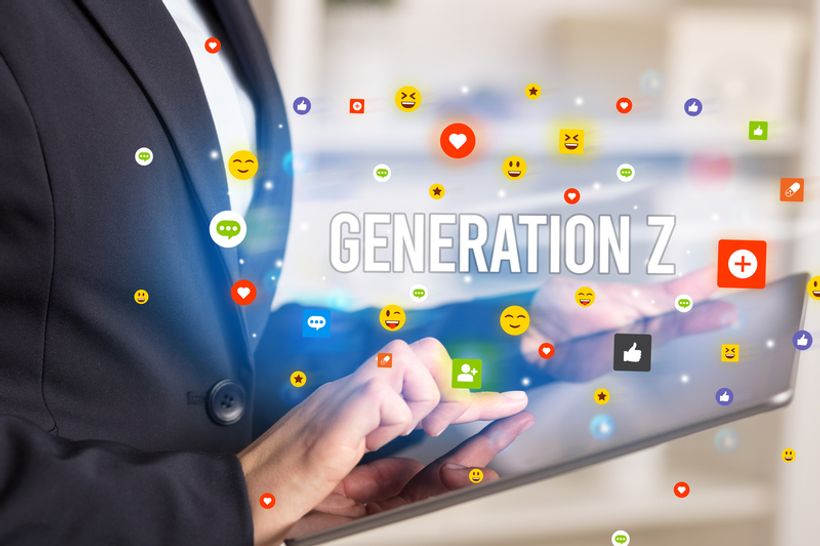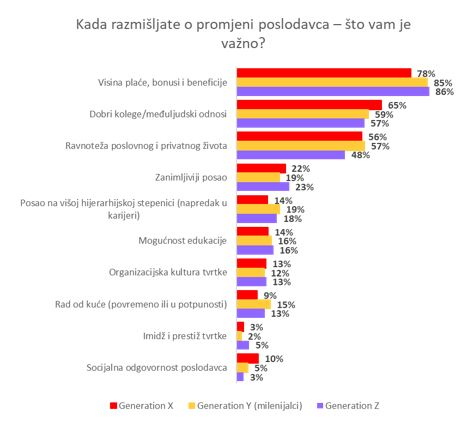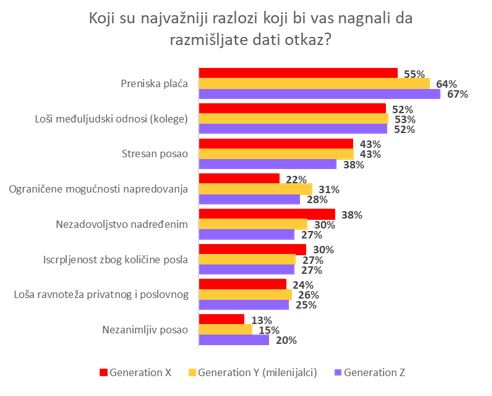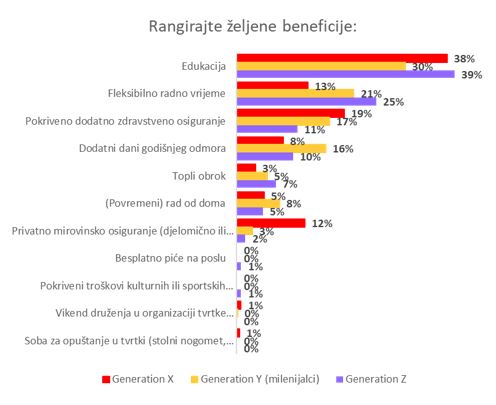
Members of Generation Z, i.e. people born between 1995 and 2010, have been present on the labor market for several years, so the time has come to evaluate how they have managed so far and what employers think of them.
At this year's HR Days conference, which reunited the regional HR community during two inspiring days in idyllic Rovinj , one panel discussion stood out as extremely relevant to the modern world of work. The panel entitled “Gen Z – management challenges, expectations, tips&tricks” offered a deeper insight into understanding and managing the newest generation of workers.
Panel participants, TikTok mentor from Crew Media Dario Marčac, psychology professor and cognitive-behavioral psychotherapist Maja Vučić, People & Communications Manager at Netgen Mateja Terek, and People Analytics expert at A1 Andrija Vrhovnik, shared their professional knowledge and experience in dealing with challenges and expectations of generation Z.
We can learn a lot from them
Arrogant, dissatisfied, demanding, open and prone to resigning based on feelings. This is how members of generation Z are often perceived by employers.
"I only partially agree with this assessment. Indeed, some of the members of Generation Z 'grow' these qualities, but we can learn a lot from them. For example, about the importance of establishing a balance between private and business life. They don't want to sit needlessly in the office and "type" the card at 5 p.m. They want to achieve their goals in many fields outside of working hours. Even more, due to their influence, over time, we will probably have to shorten working hours to 6 hours", Maja Vučić pointed out.
We must not generalize, regardless of which group of workers we are talking about, says Dario Marčac, TikTok mentor at the Crew Media company, who is also a member of generation Z himself.
"Just like among the older generations, there are also wonderful, hardworking and flexible people among Generation Z, as well as those who are somewhat more challenging to work with. Also, I believe that we will earn respect if we have quality work and professionalism behind us", says Marčac and adds that the youngest participants in the labor market have one, but significant, comparative advantage compared to the older generations, and it is an excellent knowledge of new technologies.
Younger workers want a democratic business world and the right to vote in it, explains Mateja Terek from Netgen. At the same time, in an effort to prove their worth, they sometimes do not care about decency. "Part of the members of Generation Z are somewhat 'weaker' when it comes to possessing soft skills, they are impatient and often have unrealistic expectations, on the other hand, they are hardworking and want to be 'thrown into the fire' immediately. And they care a lot about well-being as well as the company's social responsibility", she adds.
When we talk about generation Z, we often hear the phrase that it is the generation "arriving" on the labor market, however Andrija Vrhovnik from A1 believes that such thinking has not been valid for some time now.
"Even 25 percent of the employees in A1 are members of generation Z. They have been here for some time and are a very important actor on the labor market. They expect the company to invest in them, they are technologically skilled, impatient, they are looking for mentorship", claims Vrhovnik and says that we can reconcile the differences between generations "only if we put ourselves 'in the shoes' of other people, trying to see and understand their perspective".
Research on the position of Generation Z on the labor market
In order to better understand the roles of generation Z in today's labor market, the leading employment portal in Croatia MojPosao has conducted extensive research on the needs and ambitions of the new generation of workers. More than 1,000 employees and almost 150 employers participated in the research, whose thoughts and experiences brought us one step closer to answering the question to what extent members of Generation Z are different from their predecessors - generation X and millennials?
We change jobs because of the salary, regardless of which generation we belong to
Regardless of which generation they belong to, all respondents when thinking about changing employers are primarily guided by salary and benefits (83% of respondents marked this as important). In second place for everyone is good colleagues and interpersonal relations (60%), while in third place is the balance between work and private life (54%).

Accordingly, the current employer would make them think about quitting: too low salary (62%), bad interpersonal relations(52%) and stressful work (41%). Although there is no difference in the order of these reasons among members of different generations, slightly more members of Generation Z react to too low a salary (67%) than do other respondents (64% of Generation Y and 55% of members of Generation X), while to a lesser extent than others they would think about quitting due to a stressful job (38% of respondents belonging to Z, and 43% of respondents from Generation Y and X).

Among the benefits, the respondents value education the most, regardless of which generation they belong to.
The second most important benefit for generation Z is flexible working hours, which was ranked first by a quarter of respondents, while a fifth of respondents of generation Y and 13% of generation X did the same. Additional health insurance, which is ranked second among generation X and generation Z only every tenth respondent put this benefit first. The situation is similar with pension insurance, which is most valued as a benefit by respondents of generation X, and least by Z.

Nowadays, it is not unusual, especially in some industries such as IT, for employees to change jobs frequently.
Most respondents believe that two to five years is the ideal time to stay with one employer (39% of Gen Z, 49% of Gen Y and 39% of Gen X).
As many as 17% of Generation Z respondents believe that the ideal time to stay with one employer is only two years. For comparison, 8% of Generation Y and 6% of Generation X consider two years ideal.
Accordingly, in the next year, as many as 51% of respondents from Generation Z plan to change jobs, while 40% of those in Generation Y, and only 31% in Generation X.
Are they underpaid or not
Unlike their predecessors, members of Generation Z feel underpaid and unfulfilled. Thus, only 38% of respondents of generation Z believe that they are fairly paid. The same opinion is shared by 46% of members of Generation X and 39% of millennials.
44% of respondents of generation Z, and 48% of generation Y and 55% of generation X said that they feel fulfilled in their workplace.
They can work remotely or in the office
Although they would work from the office to a less extent than other generations (23% of Gen Z, 26% of Gen Y and 31% of Gen X), to a greater extent than others, members of the Z generation do not care where they work from - from office or from home (27% vs. 20% at Y and 22% at X).
Interestingly, members of generation Z would work in domestically owned private companies to a greater extent than other respondents (23% compared to 20% of the other generations) and at the same time, to a lesser extent than the rest, would work in foreign-owned private companies (33% compared to 45% generation Y and 41% of generation X). Members of generation Z (21%) would work in state-owned companies to a greater extent than members of other generations (13% Y and 16% X).
What do the employers say?
A high 93% of employers notice generational differences in their employees. If you were to describe a typical member of a certain generation, it would look like this:
- Generation X: loyal, obedient, satisfied, hardworking
- Generation Y: hardworking, ambitious, independent, organized
- Generation Z: arrogant, dissatisfied, demanding, open
In addition to not ascribing good qualities to them, employers believe that there is a higher fluctuation (86%) among this generation, and when hiring, they ask for a higher salary, better benefits and working conditions than members of other generations.
Employers noticed differences in reasons compared to other generations when resigning:
With generation Z, it is mostly impatience about advancement.
They will resign impulsively even if the smallest thing doesn't suit them, they won't be afraid like previous generations that they won't be able to find another job, generation Z will certainly not allow themselves to be mobbed at work, which happened to millennials.
They resign by feeling, do not use arguments and think that they do not need to argue anything.
Generation Z is focused exclusively on themselves and their interests without compromise - they are focused on the current state of their own emotions in relation to work and business obligations, they strive for big earnings without a lot of effort and work, they want to be in management positions but do not want the responsibility and obligations that come with them.
About the research:
The survey was conducted online on 1,200 respondents and 130 employers. Women make up 60% of respondents, while men make up 40% of respondents. The majority of participants in the survey were members of the Y generation (44%), followed by the X generation (39%) and 15% of the Z generation.
Most respondents with secondary education (51%) and university education (30%) took part in the research. The vast majority of survey respondents are employed (86%).
39% of respondents are employed in domestically owned private companies, and 25% in foreign owned ones. 8% work in Croatian institutions, and 7% of respondents work in state-owned companies.
Most respondents (38%) are employed in large companies with more than 200 employees, 28% in medium-sized companies (20-199 employees), while 19% of respondents are employed in small companies with less than 20 employees.
In the survey, on the side of employers, there were mostly small ones (42%), 30% from medium-sized companies and 28% from large companies. Most of the employers are in domestically owned private companies (58%), while 27% are foreign owned.





